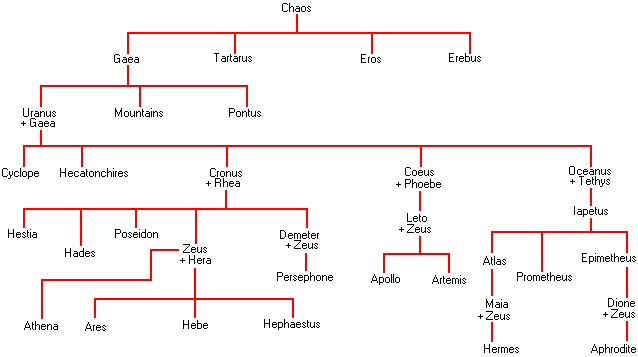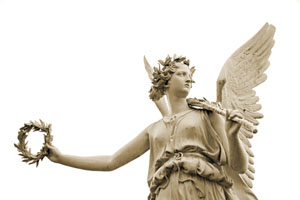Greek Mythology
The ancient Greeks were polytheistic. This means they believed in many gods.
Writers and artists use the stories and symbols of Greek myths to this day. While we no longer view the myths as religion, many people still enjoy reading them. Today, most people who live in the Western Hemisphere believe in one god. People who believe in one god are monotheistic.
Myths are traditional stories. The Greeks used myths to explain things they did not understand. At first, myths were passed down from generation to generation by word of mouth. Later, Greek poets created epic stories based on those legends. An epic is a long poem about great heroes and their deeds.
The Greek gods lived atop Mount Olympus, the highest mountain in Greece. Zeus was the head of the family of gods. He ruled the sky with his powerful thunderbolt. One of his brothers, Poseidon, ruled the sea; another brother, Hades, ruled the "underworld." Zeus's wife, Hera, was the goddess of women and marriage.
Zeus wasn't always faithful to Hera. He had many affairs with other gods and humans. In one myth, Zeus lived with Mnemosyne, the goddess of memory, for nine days. Their union produced nine daughters known as the "muses." The nine muses were the goddesses of inspiration, learning, and the arts. Words like music, amusing, and museum originally referred to the goddesses.
The Greeks would often consult priests or priestesses called oracles before making important decisions. They believed that the gods spoke to the oracles. The oracles were said to be able to read the rustling of leaves or marks on animals as signs from the gods. The oracles would often respond in unclear ways so it would be difficult for people to prove them wrong.
Top Twelve Greek Deities
Aphrodite - Goddess of love, romance, and beauty. Her son was Eros, god of Love (though he is not an Olympian)
Apollo - Beautiful god of the sun, light, medicine, and music.
Ares - Dark god of war who loves Aphrodite.
Artemis - Independent goddess of the hunt, the forest, wildlife, childbirth, and the moon. Sister to Apollo.
Athena - Daughter of Zeus and goddess of wisdom, war, and crafts. Sometimes spelled "Athene".
Demeter - Goddess of agriculture and mother of Persephone (again, her offspring is not considered to be an Olympian).
Hephaestus - Lame god of fire and the forge. Sometimes spelled Hephaistos. The Hephaestion near the Acropolis is the most beautifully preserved ancient temple in Greece. Mated to Aphrodite.
Hera - Wife of Zeus, protector of marriage, familiar with magic.
Hermes - The speedy messenger of the gods, god of business. The Romans called him Mercury.
Hestia - Calm goddess of home and homelife, symbolized by the hearth which holds the continually-burning flame.
Poseidon - God of the sea, horses, and of earthquakes.
Zeus - Supreme lord of gods, god of the sky, symbolized by the thunderbolt.
Greek God Family Tree

Summaries of Popular Greek Myths
Little Hermes
Hermes was the son of Zeus and Maia, a nymph. He was born already walking and talking. The day he was born, Hermes constructed the lyre, a kind of harp. Then he stole fifty of Apollo's sheep, sacrificing two of them to the gods. Being the god of thiefs, Hermes cleverly concealed all of his tracks. However, Apollo was the god of prophecy, so he found out that Hermes had stolen his sheep. Hermes then had to exchange his lyre for the sheep. Then the two gods became friends.The Kidnapping of Persephone
Persephone was a young maiden, the daughter of Demeter, the earth mother. It came to pass that Hades fell in love with her. He kidnapped her one day, taking her to his underworld kingdom. Demeter was very grievous when she found out about her daughter's disappearance. She left Olympus and wandered in the form of an old woman. Because of her absence, there was a great famine. Finally Zeus sent Hermes to Hades to bring Persephone back. Before letting her go, Hades gave her seven pomegranate seeds to eat. Later it turned out that because of this she had to go back to him. So now Persephone spends seven months in the underworld, which are the cold, lifeless months. The remaining warm, sunny months she spends with her mother back on Earth.Don't look back!!
Orpheus could make such beautiful music that even trees and animals would crowd around him to listen. Orpheus was in love with the lovely Eurydice. But she got bitten by a snake and died. Orpheus was inconsolable. He went down to the underworld, playing his music as skillfully as he could, mezmerising the guards. Moved by his music, Hades told him to go back, promising to send Eurydice after him. The only condition was that Orpheus not look back on his way up. Orpheus started on his way back. But when he had almost reached the light, he could not resist and turned around. He saw his beloved Eurydice's shadow dissolve behind him. Orpheus tried to go back, but he could no longer get into the underworld. Then Orpheus started wandering around the world, playing his harmonious music, until some maddened women murdered him, and he went to the underworld to be with his Eurydice.Athena's Gift
Long ago in Greece, King Cecrops established a city. It was predicted that the city would become very famous and prosperous. Many gods wanted to become the special patrons of the city. In the end there were two contestants left--Athena and Poseidon. To resolve the conflict each one was supposed to give some kind of a gift to the city, and whoever presented the greater gift would win the contest. Poseidon made a (water)spring appear in the city and promised a strong navy to the city. Athena made the olive tree. She told everyone how olives could be used for food, for cleansing, offerings, to light fires, and many other uses. Athena won the contest and the city was called Athens in her honor.The Artist Lover
Pygmalion was a handsome young sculptor. He was devoted to his art and his one goal was to make a statue of perfect beauty. For a long time he worked and worked. Finally he made a perfect ivory statue of a girl. Pygmalion named her Galatea. He would dream of it coming alive day and night. One day, on the festival of Aphrodite , he gave the goddess many gifts. When he got home, he looked at Galatea and it seemed to him that she stirred. He came up to her and kissed her. Suddenly she came alive. The ivory grew soft and she opened her eyes. Then she stepped down from her pedestal. The next day the couple went to Aphrodite's shrine to thank the goddess.Vanity Flower
Narcissus was a beautiful boy with whom many nymphs and maidens fell in love. One of them was a nymph, Echo. Echo could not talk, only repeat the last words of others. But Narcissus did not love her back. In fact, he was downright cruel to her. The unhappy Echo hid away and wasted away until all that was left of her was her voice. The gods decided to punish Narcissus for this. He was brought to a pool, where he fell in love with his own reflection. From that time on, he could not tear himself away from the pool, hopeless and desperate. Finally the gods took pity on him and turned him into a flower that grew near the pool.
